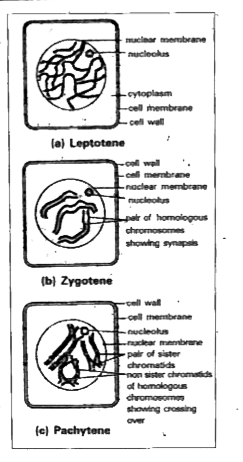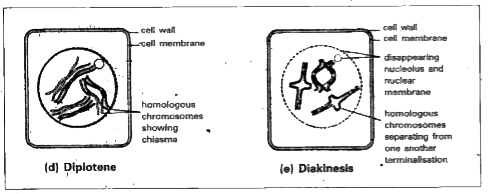In the following stage oogonia stop their division and enter into prophase - I of meiotic divisionSolution in Telugu
Meiosis is longer phase and consists of sub phases namely Leptotene, Zygotene, Pachytene, Diplotene and Diakinesis.
a) Leptotene : The nucleus increases in size by ansorbing water from the cytoplasm. The chromatin material organises into a constant number of chromosomes. The chromosomes are long, slender and show bead like structures called chromomeres.

b) Zygotene : The chromosomes become shorter and thicker. They approach each other and from pairs. This homologus pair is called bivalent and the process of paring is called synapsis. It is accompanied by the formation of synaptonemal complex. The synapsis occurs at poterminal point or procentric or random means.
c) Pachytene : Bivalent chromosomes now clearly appear as tetrads. This stage is characterised by the presence of recombination modules, the sites of which crossing over occurs between the no-sister chromatids of the homologus chromosomes. Crossing - over is the exchange of gentic material between the two homologous chromosomes. It is also an enzyme mediated process by .recombinase. crossing over leads to recombination of genetic material on the two chromosomes.
d) Diplotene : The homologous chromosomes of a bivalent being a separate from each other except at the sites of cross overs to dissolution of synaptonemal complex. The .X. shaped structures are called chalsmata. The Chromatids undergo condensation, contraction and thickening.

e) Diakinesis : It is marked by terminalisation of chaismata. In this phase, the chromosomes are fully condensed and the meiotic spindle is assembled to prepare the homologus chromosomes for separation. By the end of this phase, the nuclear membrane breaks down the nucleolus disappears.
Topper's Solved these Questions
- BOOK - VIKRAM PUBLICATION ( ANDHRA PUBLICATION)CHAPTER - CELL CYCLE AND CELL DIVISIONEXERCISE - Long answer type question5videos
CELL CYCLE AND CELL DIVISION
- BOOK - VIKRAM PUBLICATION ( ANDHRA PUBLICATION)CHAPTER - CELL CYCLE AND CELL DIVISIONEXERCISE - Textual exercise5videos
CELL CYCLE AND CELL DIVISION
- BOOK - VIKRAM PUBLICATION ( ANDHRA PUBLICATION)CHAPTER - CELL CYCLE AND CELL DIVISIONEXERCISE - Important question6videos
CELL CYCLE AND CELL DIVISION
- BOOK - VIKRAM PUBLICATION ( ANDHRA PUBLICATION)CHAPTER - CELL : THE UNIT OF LIFEEXERCISE - Important Questions24videos
CELL : THE UNIT OF LIFE
- BOOK - VIKRAM PUBLICATION ( ANDHRA PUBLICATION)CHAPTER - DIVERSITY OF LIVING WORLDEXERCISE - Short Answer Type Questions10videos
DIVERSITY OF LIVING WORLD
Similar Questions
Discuss on the statement - Telophases of prophase.
01:14View SolutionName a stain commonly used to colour chromosome.
03:19View SolutionWhat attributes does a chromatid require to be classified as a chromosome ?
01:52View SolutionVacuole in a plant cell:
04:21View SolutionPhylogenetic system of classification is based on
02:56View SolutionThe first meiotic division during oogenesis is completed at the stage of
01:14View SolutionThe stage between two meiotic division is called
01:49View SolutionThe stage between two meiotic divisions is called
01:45View SolutionThe stage between two meiotic divisions is called
04:10View Solutionअर्धसूत्री विभाजन की प्रोफेज-I की विभिन्न अवस्थाओं को चित्र द्वारा दर्शाइए ।
03:22View SolutionThe first meiotic division during oogenesis is completed at the stage of
03:17View SolutionThe stage between the two meiotic divisions is
01:55View SolutionLampbrush chromosomes occur at _____ stage of meiotic Prophase I.
01:52View SolutionThe Chiasmata is formed during which stage of Prophase-I of the Meiotic cell division?
04:07View SolutionThe stage between two meiotic divisions is called:
View SolutionThe stage between two meiotic division is called
01:33View Solution

